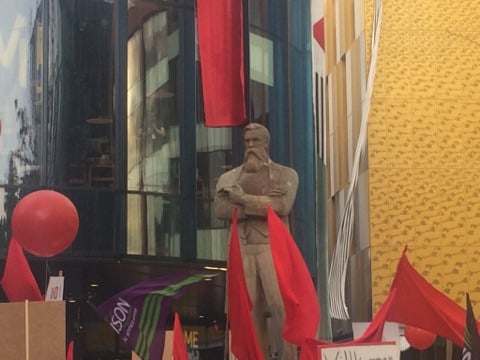
For the last month, the Manchester International Festival has been playing out across the city in a whirl of eclectic performances and previously undiscovered talent. The 16th July marked the end of the festival, with the closing ceremony being the finale of all it was intended to represent. What is the city but the people? As with the opening ceremony – a fashion show where the models were regular Mancunian folk sharing their stories – the closing was all about the people of Manchester themselves.
The festival has come under attack in recent years for bringing people from all over the world (let’s be honest, mainly London), but overlooking the home city itself. So, this year, there was a special focus on the local community. The closing ceremony was a film featuring the return of Engels to Manchester, via a statue of him torn down in the Ukraine. Engels, the handsome mill owner, philosopher, communist, friend of Marx and devoted partner of Mary Burns, lived in Manchester for 20 years.
The film fluctuated between footage of Engels’ statue being transported and people’s interactions with it along the way, stories from ‘ordinary’ people around Manchester, live interviews from the event, and clips from Ukraine where the statue originated. The conclusion of the ceremony was the statue being set up outside HOME and a procession of red flags, laughing faces and shouts of “FUCK THE TORIES LIKE THEY’VE FUCKED US”. There’s no city quite like Manchester.
From the see-through tops with nipple tape, to the welcome expression of a black woman’s anger, and the poetic call to resist through to the flowing booze and cigarettes being passed, it’s fair to say that Manchester is a political anomaly in many ways, and MIFs closing ceremony captured that. It’s perhaps one of the few cities in the UK where there would be an open cheer for communism, and a baseline assumption that zero-hour contracts have to go, and the minimum wage should be raised. The stories shared were designed to break your heart, and inspire activism.
One woman in the film spoke of sleeping on the streets, and wanting nothing more than regular contact with her child. Another said she had no choice but to go back to work after a stroke: she couldn’t afford not to. An immigrant man laughed when asked “Do you mind what kind of work?” when applying for Jobseeker’s Allowance, as if he had that choice.
The film captured the spirit of Manchester, and its lean to the left at a time when the world seems to be toppling in the other direction. Sure, there was an irony in the fact that the film was shown in an NCP car park (a corporate chain pretty far from the communist message), and the film could definitely have done with some tighter editing at times, but the story it tells is important. As Maxine Peak so eloquently put it, this festival, and the closing ceremony itself, was all about hope.
Hope that we will keep on funding the arts and fighting for our future, hope that we will keep on resisting, and hope that we will come together to fight for the future. MIF created an opportunity for ideas to be expressed, but it was poignant that this ended with a statue of Engels, a man with a vision for the future. Saying no to austerity and cuts and the Tories isn’t enough: we need to say yes and have a clear alternative of what to put forward. Festivals like MIF help us piece together that new narrative.
It’s always been hard for those on the left to come together, and avoid splitting into factions with differing visions for what the future should look like. Right now, however, it’s absolutely essential that we do come together and form a movement that’s as inclusive as possible, to forge a future where our society is as equal as possible. Whilst not perfect, MIFs closing ceremony offered a glimpse of what that future might look like.
Filed under: Politics

Comments